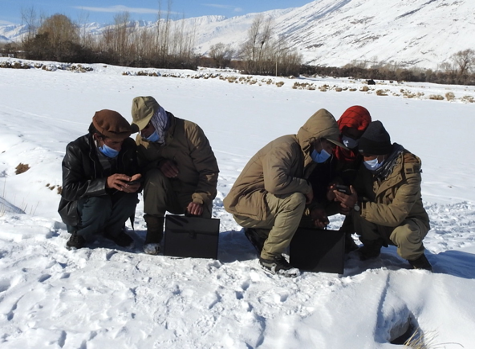
SLN is pleased to welcome the WCS Afghanistan team for this special Country Update. The Wakhan Corridor is a narrow strip of isolated high mountain terrain in the far northeast of Afghanistan. The landscape is situated in the western part of the snow leopard range, linking with Pakistan, Tajikistan and China. WCS in close partnership with the government of Afghanistan, has collated critical information about snow leopards in Wakhan through camera trapping and collaring. It also continues implement with district authorities varied community-based conservation action in this extremely remote part of the country.
Do welcome Mr. Sorosh Poya Faryabi and Dr. Eve Bohnett and join us to listen to this very interesting presentation and discussion.

About the talk
This webinar provides an overview of recent snow leopard conservation efforts in the Wakhan National Park (WNP), a 10,950km2 GSLEP designated ‘priority landscape’ in Afghanistan. The National Park is situated at the junction of the Pamir, Hindu Kush and Karakoram mountain ranges. WNP is co-managed by communities and the national government as an IUCN Category VI protected area. Since 2006 it has received contributions from numerous bilateral donors for conservation actions undertaken by the government, with the technical support of WCS. This region hosts the core of the snow leopard population in Afghanistan.
Mr. Sorosh Poya Faryabi, Conservation and Science Manager for WCS Afghanistan, will provide an update on the status of snow leopards in the country. This will start off with the history of WCS engagement in snow leopard conservation in the country, followed by an overview of conservation efforts to protect snow leopards in WNP. Dr. Eve Bohnett will describe the population assessment approach and associated challenges the team has experienced in identifying snow leopard individuals with artificial intelligence in the Wakhan. Finally, the presenters will look ahead and share ideas for the future development for snow leopard monitoring in the country.
This presentation is a tribute to the People of Wakhan who provide snow leopards a safe haven in their area.


About our Guests
Mr. Sorosh Poya-Faryabi joined WCS Afghanistan as Training Education and Outreach Adviser (2013- 2015) and was then promoted to the position of Conservation and Science Manager (2017). In this role, Sorosh oversees the overall implementation of conservation science actions for WCS in Afghanistan and particularly in the Wakhan National Park, which hosts the core population of snow leopards in the country. Before joining WCS, Sorosh worked as a programme officer at the Asia Foundation and was a member of the Extractive Industries Transparency Initiative. Sorosh received a M.Eng from the University of York in 2008 and a MPhil in conservation from the University of Cambridge in 2016.
Dr. Eve Bohnett is currently a contractor with WCS Afghanistan and a postdoctoral research fellow at San Diego State University, USA. Her interests include statistical ecology, teaching data science skills, conservation planning, and environmental governance. Eve received her Ph.D. from the University of Florida (2016-2020). Her dissertation research focused on spatio-temporal modelling for assessing landscape biodiversity and species distributions for birds and mammals using occupancy modelling and machine learning. Eve also received a M.Sc. from Wildlife Institute at Beijing Forestry University (2012-2015) while participating in research for wild felid and large mammal survey methods, mostly camera trapping study design and analysis. Her favourite hobbies are singing/song writing, studying Chinese, and traveling to pilgrimage places.

Date/Time:Tuesday, 30th March, 2021; 17:00 Afghanistan Time (AFT)
Location: ZOOM, to join this talk, REGISTER HERE
Please note
- If you have never used Zoom before, we recommend that you try the link 10 minutes before the start of the lecture.
- Please feel free to write questions in the comment area and there will be time for questions/discussion at the end of the talk.
- Please note that the session will be recorded and later featured on the SLN website. If you have concerns about this please let us know before the session.


